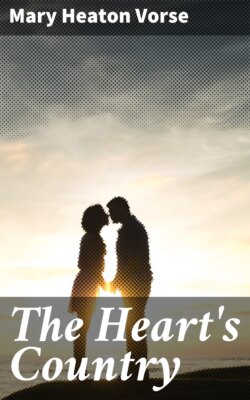Читать книгу The Heart's Country - Mary Heaton Vorse - Страница 6
На сайте Литреса книга снята с продажи.
CHAPTER IV
ОглавлениеTable of Contents
Ellen wrote about this time:—
“Grandma Hathaway, Aunt Sarah and mamma, all don’t know what to do about me. I should be much grown-upper than I am. ‘Mercy,’ said Aunt Sarah, ‘that great girl of yours, Emily, acts so that she makes me tremble for fear she will some day swing by a tail from a bough, like a monkey.’ [Here we see Miss Grant foreshadowing the Darwinian theory.] They don’t know I try to be good, but I do try; but when joy gets into my feet I have to run, and I love to feel like that. I think I only try to be good when I am not happy. I have said my prayers about it, and the awful thing is when I say my prayers I feel as if God said: ‘Never mind, Ellen, run if you like.’ They always say to me: ‘Why can’t you sit and sew under the trees with the other girls?’ Oh, if they only knew what we talked about when we sit and sew! And even Roberta does, though she disapproves of all silliness. I have never seen any girl disapprove of all silliness as does Roberta. But what we sit and talk about is beaux, though Roberta doesn’t call hers that, and he isn’t. And when Roberta talks so beautifully, I often talk the same way, but deep in my heart I know I wish I had a real beau, like the grown-up girls we talk about. It’s strange, though, that Roberta has none, because she has more of one than any of the rest of us, because she writes notes to Leonard Dilloway and he carries home her books. When I said, ‘He is your beau,’ she was very shocked. ‘I wish you would not speak so to me,’ she said, ‘it pains me. I shall never love, anyway, but once. I am far too young to think of such things.’ ‘Why do you do it?’ I asked her. This made her cross. ‘I don’t,’ she answered. ‘Leonard is my friend.’ But the rest of us know she is in love. So when they talk to me about being a hoyden and ask me to sit and sew, I feel like a hypocrite, because I know that young girls like us are much more grown-up than they were when Aunt Sarah and Grandma Hathaway were young, and that they would dislike one as much as the other. Though I am young in actions I have such old thoughts that I am surprised and wish I could help being proud of myself for them. I have older thoughts than Janie or Mildred, or even Roberta. Roberta sounds older, but her thoughts are tied with strings while mine are not.”
This sketch of hers is an accurate picture of the conversations between young girls that are going on forever and ever when three or four long-legged youngsters are together. Their talk leads inevitably, as did ours, toward their business in life. To the lads we were adventures—not to be confused with the real business they had to do in the world; to us they were life itself.
Like all young girls, we lived in a close little world of our own. No one entered it, nor could we come out toward others’. We were passionate spectators at the feast of life, picking up the crumbs of experience which came our way; for in our civilization we are treated as children at an age when Juliet ran away for love, and Beatrice set Dante’s heart to beating. And yet our hearts beat, and we were tragic and ineffectual Juliets, appearing on our balconies to youths who saw only the shortness of our skirts. We knew without knowing that our little lean arms were to be the cradles of the unborn generation. Forever and ever we tried to tell those whom we met, “I am Eve,” and couldn’t, not knowing the way past the angel with the flaming sword of self-consciousness.
It was the great adventure of Janie Acres which made us conscious of our absorption in boys. There had been a merry-making which took place in a barn, and in talking it over afterwards, we recounted the conversation of each boy who had spoken to us, giving the impression of having snubbed them one and all; which, indeed, we often did, but against our wills, because embarrassment made us gruff.
Janie had the adventure of hiding in the same corn-bin with a lad, and what occurred in the corn-bin she was coy of telling. When pressed, she flushed and looked the other way. It was Ellen who brought the utter innocence and lack of romance to light with her merciless truthfulness.
“Did he kiss you?” asked she.
We were shocked at her frankness. We never spoke of such things as kisses directly. The delicacy of our little souls was deeply wounded.
And Janie replied:—
“Well, not exactly. But,” she faltered, “he would have if I had stayed there.”
“How do you know?” asked Ellen coldly.
Thus it was she pricked the bubble of sentiment. We were all rather horrified, immensely interested and rather envious. We now perceived our sentimentality. We ourselves were shocked a little by some of our temerities, for in the wide conspiracy of silence around us we imagined we were the only adventurous ones in the world. Characteristically, it was I who suggested that momentous association, the “Zinias,” or “Old Maid Club.”
Ellen wrote:—
